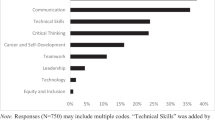Abstract
Adults returning for higher education find nontraditional methods more convenient to their schedules. Problems and needs occur when an adult adds education to a busy schedule. The nontraditional method may also add to these problems. It is important for learning institutions and nontraditional programs to investigate the types and the scope of these problems and needs and the availability of support the student will receive from others to help overcome the problems. Critical to the issue of problems and needs is the understanding of the adult perspective towards learning and independence.
Similar content being viewed by others
References
Apt, P.H. Adult learners and higher education: Factors influencing participation or nonparticipation decisions.Alternative Higher Education, 3, (1), 3–11, 1978.
Beshiri, P.H. Answering the critics: A comparative study of external degree and traditional graduates.Alternative Higher Education, 3, (3), 195–209, 1978.
Block, R., Davidson, J.L., Grambs, J.D., and Serock, K.E. Uncharted Territory: Issues and concerns of women over 40. Maryland: Center on Aging, University of Maryland, 1978.
Carnegie Commission on Higher Education.Less Time, More Options. New Jersey: McGraw-Hill Book Company, 1971.
Cross, P.K., Valley, J.R., and Associates.Planning nontraditional programs. San Francisco: Jossey-Bass, 1976.
Empire State College. Attrition of assessed students. A report by the Office of Research and Development of ESC, Gr-4, Nov., 1975.
Farmer, M.L.Counseling services for adults in higher education. Metuchen, NJ: The Scarecrow Press, Inc., 1971.
Feldman, S.D.Escape from the doll's house. New York: McGraw-Hill Book Company, 1974.
Fisher, J.A.Educational counseling for adults. A document published for the U.S. Department of Health, Education, and Welfare, Drake University, 1969.
Gilbert, J. Contract learning.Alternative Higher Education, 1, (1), 25–32, 1976.
Hesburgh, T.M., Miller, P.A., and Warton, C.R. Jr.Patterns for lifelong learning. San Francisco: Jossey-Bass, 1974.
Katz, N., Liskar, R., Myers, M., and Peterson, B.J. The subject as subject: A study of the returning woman student.Council on Anthropology and Education Quarterly, 6, (3) 19–22, 1975.
Kidd, J.R.How adults learn. New York: Association Press, 1973.
Knowles, M.The adult learner: A neglected species. Houston: Gulf Publishing Company, 1973.
——Higher adult education in the United States. Washington, D.C.: U.S. Printing, 1969.
Lowe, J.The education of adults: A world perspective. Paris: The UNESCO Press, 1975.
Martorana, S.V., and Kuhns, E.Managing academic change. San Francisco: Jossey-Bass, 1975.
More, William S.Emotions and adult learning. Lexington, Mass.: Saxon House/Lexington Books, 1974.
Olski, K. Psychological needs of returning adults in nontraditional degree programs. University of Wisconsin-Green Bay, 1979.
Pagano, J.O. Linking a community of learners with a community of scholars.International Review of Education, 23, (2), 205–216, (1977).
Author information
Authors and Affiliations
Rights and permissions
About this article
Cite this article
Olski, K. Problems and issues raised by returning adults. Alternative Higher Education 5, 100–105 (1980). https://doi.org/10.1007/BF01079659
Issue Date:
DOI: https://doi.org/10.1007/BF01079659



